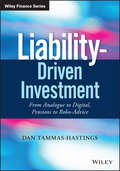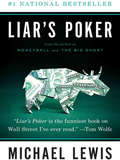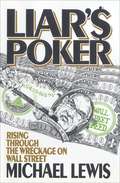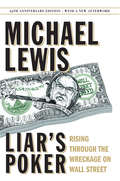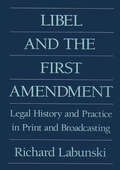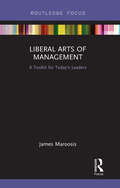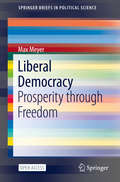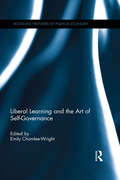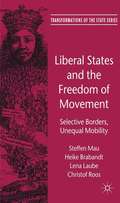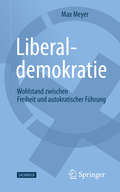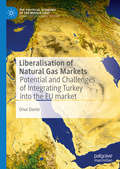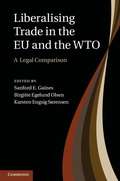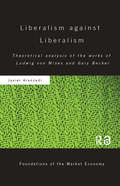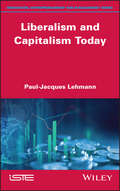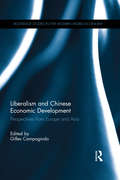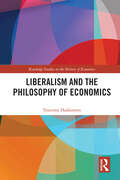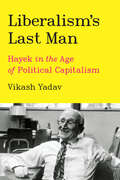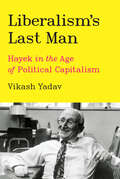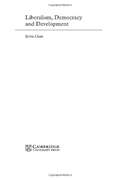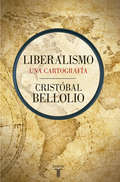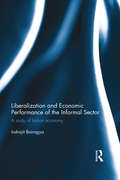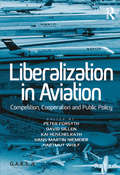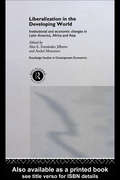- Table View
- List View
Liability-Driven Investment: From Analogue to Digital, Pensions to Robo-Advice (Wiley Finance)
by Dan Tammas-HastingsUnderstand the investment template that dominates the pension industry Liability-Driven Investment is the practitioner’s guide to this increasingly popular investment template. Already the dominant framework for pension schemes in Europe and the UK, the LDI market is expected to grow significantly with the shift from Defined Benefit to Defined Contribution, and then into Digital Asset Management — or Robo-Advice. With an aging population and significant under-saving globally, more and more finance professionals will need to know how to work within and around the LDI framework; this book provides clear explanations for the framework’s usefulness and growing popularity to help practitioners find their bearings in and around the LDI space. The ultimate goal of LDI is to move beyond simple asset value maximisation and ensure that investors have sufficient funds to pay liabilities. This informative guide digs into that basic premise to show the various mechanisms, guidelines and practices that make up the framework’s “working parts.” Discover the optimal investment strategies in multiple assets classes Understand the key characteristics of the instruments used, including bonds, interest rate derivatives, and inflation linked products Learn why pension companies and individual investors are moving toward LDI Explore the ways in which the explosive growth of Robo-Advice will change retail investment Finance professionals have long been accustomed to shifting landscapes — it is taken as a given that prevailing thought and attendant practices will change over time — but the rapid expansion of LDI has taken many by surprise. Having already been established as the dominant framework for pensions, it is clear that the emphasis on LDI will only continue to grow. Liability-Driven Investment tells you what you need to know in order to work effectively with LDI.
Liar's Poker: Rising Through The Wreckage On Wall Street (Hodder Great Reads Ser. #10)
by Michael LewisThe time was the 1980s. The place was Wall Street. The game was called Liar's Poker. Michael Lewis was fresh out of Princeton and the London School of Economics when he landed a job at Salomon Brothers, one of Wall Street's premier investment firms. During the next three years, Lewis rose from callow trainee to bond salesman, raking in millions for the firm and cashing in on a modern-day gold rush. Liar's Poker is the culmination of those heady, frenzied years--a behind-the-scenes look at a unique and turbulent time in American business. From the frat-boy camaraderie of the forty-first-floor trading room to the killer instinct that made ambitious young men gamble everything on a high-stakes game of bluffing and deception, here is Michael Lewis's knowing and hilarious insider's account of an unprecedented era of greed, gluttony, and outrageous fortune.
Liar's Poker: Rising Through The Wreckage on Wall Street
by Michael LewisIn this shrewd and wickedly funny book, Michael Lewis describes an astonishing era and his own rake's progress through a powerful investment bank. From an unlikely beginning (art history at Princeton?) he rose in two short years from Salomon Brothers trainee to Geek (the lowest form of life on the trading floor) to Big Swinging Dick, the most dangerous beast in the jungle, a bond salesman who could turn over millions of dollars' worth of doubtful bonds with just one call. With the eye and ear of a born storyteller, Michael Lewis shows us how things really worked on Wall Street. In the Salomon training program a roomful of aspirants is stunned speechless by the vitriolic profanity of the Human Piranha; out on the trading floor, bond traders throw telephones at the heads of underlings and Salomon chairman Gutfreund challenges his chief trader to a hand of liar's poker for one million dollars; around the world in London, Tokyo, and New York, bright young men like Michael Lewis, connected by telephones and computer terminals, swap gross jokes and find retail buyers for the staggering debt of individual companies or whole countries. The bond traders, wearing greed and ambition and badges of honor, might well have swaggered straight from the pages of Bonfire of the Vanities . But for all their outrageous behavior, they were in fact presiding over enormous changes in the world economy. Lewis's job, simply described, was to transfer money, in the form of bonds, from those outside America who saved to those inside America who consumed. In doing so, he generated tens of millions of dollars for Salomon Brothers, and earned for himself a ringside seat on the greatest financial spectacle of the decade: the leveraging of America.
Liar's Poker: Rising Through the Wreckage on Wall Street (25th Anniversary Edition) (Hodder Great Reads Ser.)
by Michael LewisThe time was the 1980s. The place was Wall Street. The game was called Liar's Poker. Before there was Flash Boys and The Big Short, there was Liar's Poker. A knowing and unnervingly talented debut, this insider's account of 1980s Wall Street excess transformed Michael Lewis from a disillusioned bond salesman to the best-selling literary icon he is today. Together, the three books cover thirty years of endemic global corruption--perhaps the defining problem of our age--which has never been so hilariously skewered as in Liar's Poker, now in a twenty-fifth-anniversary edition with a new afterword by the author. It was wonderful to be young and working on Wall Street in the 1980s: never before had so many twenty-four-year-olds made so much money in so little time. After you learned the trick of it, all you had to do was pick up the phone and the money poured in your lap. This wickedly funny book endures as the best record we have of those heady, frenzied years. In it Lewis describes his own rake's progress through a powerful investment bank. From an unlikely beginning (art history at Princeton?) he rose in two short years from Salomon Brothers trainee to Geek (the lowest form of life on the trading floor) to Big Swinging Dick, the most dangerous beast in the jungle, a bond salesman who could turn over millions of dollars' worth of doubtful bonds with just one call. As he has continued to do for a quarter century, Michael Lewis here shows us how things really worked on Wall Street. In the Salomon training program a roomful of aspirants is stunned speechless by the vitriolic profanity of the Human Piranha; out on the trading floor, bond traders throw telephones at the heads of underlings and Salomon chairmen Gutfreund challenges his chief trader to a hand of liar's poker for one million dollars.
Libel and the First Amendment: Legal History and Practice in Print and Broadcasting
by Richard E. LabunskiAs the recent cases involving William Westmoreland and Ariel Sharon re-veal, libel suits filed against media organizations have become an increas-ingly serious problem in recent years. The potential for inhibiting news coverage or even putting a news organization out of business has never been greater. This book explores historical and contemporary issues relating to libel suits against media organizations, emphasizing the consequences of the development of libel law for the First Amendment. It also considers the spe-cial problems that broadcasters have with libel suits and their potentially in-hibiting effect on television news coverage. Labunski traces the development of libel law largely from 1964, when the Supreme Court entered the libel arena for the first time and began a twenty-year effort to develop standards that are fair to both sides. He de-scribes the hostile environment which journalists must enter when they de-fend themselves in court. He also demonstrates the complexity and inconsis-tency that have resulted from the state-by-state creation of libel standards. Labunski offers suggestions, some more easily accomplished than others, that will help us get out of the libel "morass" which twenty years of Su-preme Court activity and lower court litigation have produced. This book will be of particular value to students of the First Amendment, communica-tion scholars, working journalists, and anyone who wants to better under-stand the complex development of libel laws and the effect of libel suits on news coverage.
Liberal Arts of Management: A Toolkit for Today's Leaders
by James MaroosisThis book analyzes and elucidates the view that the purpose of the liberal arts is to offer leadership training and guidelines for success. This professional or managerial tradition of the liberal arts is discussed historically, revisiting three central claims purported by the Ancients to make the point that management and the liberal arts are connected and build off each other to provide a framework for leadership in both domains. This book will appeal to researchers in leadership studies, management, and the liberal arts.
Liberal Democracy: Prosperity through Freedom (SpringerBriefs in Political Science)
by Max MeyerThis open access book aims to show which factors have been decisive in the rise of successful countries. Never before have so many people been so well off. However, prosperity is not a law of nature; it has to be worked for. A liberal economy stands at the forefront of this success – not as a political system, but as a set of economic rules promoting competition, which in turn leads to innovation, research and enormous productivity. Sustainable prosperity is built on a foundation of freedom, equal opportunity and a functioning government. This requires a stable democracy that cannot be defeated by an autocrat. Autocrats claim that “illiberalism” is more efficient, an assertion that justifies their own power. Although autocrats can efficiently guide the first steps out of poverty, once a certain level of prosperity has been achieved, people begin to demand a sense of well-being – freedom and codetermination. Only when this is possible will they feel comfortable, and progress will continue. Respect for human rights is crucial.The rules of the free market do not lean to either the right or left politically. Liberalism and the welfare state are not mutually exclusive. The “conflict” concerns the amount of government intervention. Should there be more or less?As a lawyer, entrepreneur, and board member with over 40 years of experience in this field of conflict, the author clearly describes the conditions necessary for a country to maintain its position at the top.
Liberal Learning and the Art of Self-Governance (Routledge Frontiers of Political Economy)
by Emily Chamlee-WrightConcerns over affordability and accountability have tended to direct focus away from the central aims of liberal learning, such as preparing minds for free inquiry and inculcating the habits of mind, practical skills, and values necessary for effective participation in civil society. The contributors to this volume seek to understand better what it is that can be done on a day-to-day basis within institutions of liberal learning that shape the habits and practices of civil society. The central argument of this volume is that institutions of liberal learning are critical to a developing and flourishing civil society. It is within these "civil society incubators" that the habits of open discourse are practiced and honed; that a collaborative (often contentious) commitment to truth seeking serves as the rules that govern our work together; that the rules of personal and widespread social cooperation are established, practiced, and refined. Many have made this argument as it relates to community based learning, and we explore that theme here as well. But acquiring and practicing the habits of civil society recur within and throughout the college context--in the classrooms, in college governance structures, in professional associations, in collaborative research, in the residence halls, and on the playing field. To put it another way, when they are at their best, institutions of liberal learning are contexts in which students learn how to live in a free society and learn the art of self-governance.
Liberal States and the Freedom of Movement
by Steffen Mau Heike Brabandt Lena Laube Christof RoosState borders regulate cross-border mobility and determine peoples' chances to travel, work, and study across the globe. This book looks at how global mobility is defined by borders in 2011 in comparison to the 1970s. The authors trace the transformation of OECD-state borders in recent decades and show how borders have become ever more selective.
Liberaldemokratie: Wohlstand zwischen Freiheit und autokratischer Führung
by Max MeyerNoch nie ging es so vielen Menschen so gut. Wohlstand ist aber kein Naturgesetz, er muss erarbeitet werden. Dieses Buch will aufzeigen, welche Faktoren für den Aufstieg erfolgreicher Länder entscheidend waren. Im Vordergrund steht dabei eine liberale Wirtschaft – nicht als politisches System, sondern in Form wirtschaftlicher Spielregeln. Die Spielregeln des freien Marktes stehen politisch weder rechts noch links, denn Liberalismus und Sozialstaat sind keine Gegensätze. Das Fundament nachhaltiger Prosperität bilden Freiheit, Chancengleichheit und ein funktionierender Staat. Bedingung dafür ist eine stabile Demokratie, die nicht von einem Autokraten infrage gestellt werden kann. Zwar können erste Schritte aus der Armut autokratisch effizient erfolgen. Sobald jedoch ein gewisser Wohlstand erreicht ist, verlangen die Menschen nach Wohlbefinden – also nach Freiheit und Mitbestimmung. Nur so treiben sie die Entwicklung weiter voran. Die Beachtung der Menschenrechte ist daher entscheidend. Mit über 40 Jahren Erfahrung als Anwalt, Unternehmer und Verwaltungsrat schildert der Autor dieses Buches in klaren Worten, unter welchen Voraussetzungen der Wohlstand eines Landes nachhaltig gesichert werden kann.
Liberalisation of Natural Gas Markets: Potential and Challenges of Integrating Turkey into the EU Market (The Political Economy of the Middle East)
by Onur DemirThis book investigates the overall natural gas reform performance of Turkey, addressing both shortfalls and setbacks that have prevented Turkey from the fulfillment of the regulatory implementation since 2001, and how the prospectively liberalised natural gas market can effectively operate at all levels. Although eighteen years have passed since the introduction of the first legislation as a basis for a more liberalised Turkish natural gas market, the completion of the reform process still suffers from a lack of enforcement. The book offers recommendations to address this, the main one being that policy makers should give due consideration to the consolidation of EMRA’s independent role with appropriate safeguards laid out to prevent attempts of regulatory misuse. The book concludes by suggesting that there is a compelling need to move forward with a consolidated reform sooner rather than later if Turkey genuinely wishes to take a leadership position in the race to become an efficient gas hub and be part of Europe’s single energy market.
Liberalising Trade in the Eu and the Wto
by Sanford E. Gaines Birgitte Egelund Olsen Karsten Engsig SørensenThis comparison of EU and WTO approaches to common trade-liberalisation challenges brings together eighteen authors from Europe and America. Together they explore fundamental legal issues, such as the role of general principles of law, the role of the judiciary in the development of law, the effect of the principle of non-discrimination and the elimination of non-discriminatory barriers to trade. The contributions also examine the most recent developments in trade law across a full range of trade issues, including TBT and SPS, services, intellectual property, customs rules, safeguards, anti-dumping and government procurement. Adopting a comparative perspective throughout, this volume sheds light on today's trade law and suggests paths forward for each system through the perennial tensions between open, non-discriminatory trade and strongly held national values and objectives.
Liberalism against Liberalism: Theoretical Analysis of the Works of Ludwig von Mises and Gary Becker (Routledge Foundations of the Market Economy)
by Javier AranzadiThe defence of the market and economic freedom have been the main objectives of the investigations by liberal thinkers such as Milton Friedman, Gary Becker, F Hayek and L Von Mises. Bearing in mind that the first two economists are the maximum exponents of the Chicago School and the last two of the Austrian School, it is often concluded that the theories of both schools are similar. This book demonstrates that in reality, there is no convergence or complementariness to be found between both schools of thought. The anthropological categories, contributed by Mises, allow us to understand all human phenomena from the view of the man who acts. In this view, economics is part of a philosophical system whose core is the creative capacity of people. Becker’s work, on the other hand, is concentrated on the generalization of the homo economicus as the basis for explaining all human behaviour. He generalizes the maximizing principle to explain all human reality, and extends the scope of the application of a so-called scientific and technical view of the world. In this key volume, an important read for those in the fields of economic theory and political economy, Javier Aranzadi argues, in essence, that the tradition of Hayek and Mises encourages a humanistic liberalism, whereas the Chicago School proposes only a technical humanism.
Liberalism and Capitalism Today
by Paul-Jacques LehmannIt now seems to be a given that the principles that presided over the birth of liberalism and capitalism are no longer relevant. To understand the evolution of this ideology and economic system, Liberalism and Capitalism Today examines the work of the two authors who have contributed the most to the analysis of the conditions that lead to the emergence of these types of organization: Alexis de Tocqueville of France and Max Weber of Germany.This book thus analyzes how the evolution of the general environment of a civilization leads to the emergence of new ways of approaching economic life, and then to its development, thanks to innovations in many fields.This historical perspective makes it possible to understand the transformations that liberalism and capitalism could offer. It suggests a potential path that does not involve simply returning to a way of life that has been totally altered by the evolution of civilizations and the economy, but instead leads to a more peaceful way of living in most countries of the world.
Liberalism and Chinese Economic Development: Perspectives from Europe and Asia (Routledge Studies in the Modern World Economy)
by Gilles CampagnoloLiberalism and Chinese Economic Development brings international contributors together in order to consider economic, political, social and legislative aspects of China’s modernization. This volume explores how liberalism is received and perceived, and whether it is adapted or adopted upon the basis of centuries of Chinese civilization and decades of capitalism. China’s role in the global economy is an undeniable force. This book examines both historical and contemporary dimensions surrounding the question of Chinese liberalism, exploring China’s economic development in a comparative context. In particular, this text explores differences with the Western model, and more specifically, the relationship between Chinese economic thought and European traditions. This text assesses China’s economic development at both a macro and a micro level, and also considers its relationship with its neighbours. Campagnolo answers whether free-trade and capitalistic economic developments are long sustainable without other types of liberal developments? Or is the idea that political liberties and economic freedom are just Western ideologies? This is a uniquely wide ranging book, suitable for scholars of the Chinese economy, the history of economic thought, economic philosophy and international political economy.
Liberalism and Socialism: Mortal Enemies or Embittered Kin? (Palgrave Studies in Classical Liberalism)
by Matthew McManusIn times of pandemic and global economic crisis, little more than a decade after the last, there are serious questions about how the liberal order can stand, who its friends are, and what the future will look like. This edited collection provides a comprehensive overview of the principles and stakes at play in the dispute between liberalism and socialism. It explores the 21st century appeal of socialism, particularly to millennials and other relatively young citizens, and shows why modern classical liberalism and neoliberalism have generated tepid support, leading to the resurgence of socialism after it was thought dead and buried due to the dramatic failures of statist models in 1989. The authors put modern socialism and liberalism into renewed dialogue with another to examine whether the two can coexist peacefully, or even reach an overlapping consensus on social reform going forward. It delves into the history and theory of both liberalism and socialism to determine points of overlap and tension, in addition to a cross-disciplinary interpretive analysis of the present epoch to determine how both traditions have evolved since the 20th century. The book is interdisciplinary and provides a broad array of perspectives including a diversity of ideological perspectives ranging from committed Marxists to libertarians. It will be of interest to academics and students in economics and contemporary political culture.
Liberalism and the Philosophy of Economics (Routledge Studies in the History of Economics)
by Tsutomu HashimotoDrawing on recent work in the contemporary philosophy of economics, this book presents new ideas on liberalism, including the concept of ‘growth-oriented liberalism’. Since the end of the Cold War, questions and definitions of liberalism have moved from the sphere of political systems (the socialism versus liberalism debates) to the sphere of ethics (what it means to live in a liberal society). The chapters in this work trace the trajectory of the concept of liberalism in the philosophy of economics by exploring the ideological implications of the methodological debate between socialism and liberalism, the idea of liberty as real freedom, the ethical implications of Max Weber’s methodology on autonomy and liberty, and new typological theories of ideologies in the context of contemporary economic ethics. This book marks a significant contribution to the literature on liberalism in the philosophy of economics and economic methodology, and is highly recommended for readers who seek updated ideas on liberal society in its ethical and philosophical contexts.
Liberalism's Last Man: Hayek in the Age of Political Capitalism
by Vikash YadavA modern reframing of Friedrich Hayek’s most famous work for the 21st century. Friedrich Hayek’s The Road to Serfdom was both an intellectual milestone and a source of political division, spurring fiery debates around capitalism and its discontents. In the ensuing discord, Hayek’s true message was lost: liberalism is a thing to be protected above all else, and its alternatives are perilous. In Liberalism’s Last Man, Vikash Yadav revives the core of Hayek’s famed work to map today’s primary political anxiety: the tenuous state of liberal meritocratic capitalism—particularly in North America, Europe, and Asia—in the face of strengthening political-capitalist powers like China, Vietnam, and Singapore. As open societies struggle to match the economic productivity of authoritarian-capitalist economies, the promises of a meritocracy fade; Yadav channels Hayek to articulate how liberalism’s moral backbone is its greatest defense against repressive social structures.
Liberalism's Last Man: Hayek in the Age of Political Capitalism
by Vikash YadavA modern reframing of Friedrich Hayek’s most famous work for the 21st century.Friedrich Hayek’s The Road to Serfdom was both an intellectual milestone and a source of political division, spurring fiery debates around capitalism and its discontents. In the ensuing discord, Hayek’s true message was lost: liberalism is a thing to be protected above all else, and its alternatives are perilous.In Liberalism’s Last Man, Vikash Yadav revives the core of Hayek’s famed work to map today’s primary political anxiety: the tenuous state of liberal meritocratic capitalism—particularly in North America, Europe, and Asia—in the face of strengthening political-capitalist powers like China, Vietnam, and Singapore. As open societies struggle to match the economic productivity of authoritarian-capitalist economies, the promises of a meritocracy fade; Yadav channels Hayek to articulate how liberalism’s moral backbone is its greatest defense against repressive social structures.
Liberalism, Democracy and Development
by Sylvia ChanMany commentators have assumed a close connection between liberal democracy and economic development. Sylvia Chan questions this assumption and suggests a new theoretical framework, in which liberal democracy is 'decomposed' into economic, civil and political dimensions that can be combined in different ways, allowing for a range of 'institutional matrices'. She then shows, in a case study of Japan and the Asian newly industrialising countries, how these seemingly less democratic countries have enjoyed a unique mix of economic, civil and political liberties which have encouraged economic development, without the need to share the institutional structures and cultural values of the West. Chan's model therefore provides a re-evaluation of the institutional capacities needed to sustain a competitive economy in a globalising world, and develops a more sophisticated understanding of the democracy-development connection.
Liberalismo: Una cartografía
by Cristobal BellolioUn mapa que ilustra las múltiples modalidades de esta corriente política e intelectual Lo que hacen estas páginas es recorrer distintos debates donde la gran familia liberal se tensiona en torno a principios o valores que no se reducen (necesariamente) a la distribución final de los recursos materiales. A partir de estas tensiones, se trazan otras tantas distinciones al interior del liberalismo. El autor propone, por tanto, siete formas de cartografiar —de ahí el título del libro— la filosofía política liberal.
Liberalization and Economic Performance of the Informal Sector: A study of Indian Economy
by Indrajit BairagyaImpact of liberalization on informality has been a subject of intense debate for many years and the major issue that has come up is whether liberalization helps to grow informal sector and informality in the economy or it is an obstruction for informal sector’s growth. Thus, in the light of the recent liberalization measure, this book sets to examine general presumptions of the development of informal sector in the context of the Indian economy. The book begins with a broad framework for analysis of output contribution and growth of the informal sector. Liberalization is measured by openness indices and inter-sectoral linkages. Impact of liberalization on growth contributions of informal sector is captured by openness indices (i.e. degree of openness to trade and principal component scores), technical efficiency (measured by Data Envelope Analysis and estimated by Tobit Censored Regression model) and components of productivity (computed by Malmquist total factor productivity index) of the informal enterprises by inter-sectoral linkages. The linkages are modeled theoretically in a neo-classical growth theory and empirically measured by sub-contracting arrangements between formal and informal enterprises. In addition, the book also provides implications on promotion of informal sector from the viewpoint of employment generation. The description and analyses of the book will help with policy implications and enlighten the readers on the development of informal sector.
Liberalization in Aviation: Competition, Cooperation and Public Policy
by Peter Forsyth Kai Hüschelrath David Gillen Hans-Martin Niemeier Hartmut WolfThe last few decades have witnessed substantial liberalization trends in various industries and countries. Starting with the deregulation of the US airline industry in 1978, regulatory restructuring took place in further network industries such as telecommunications, electricity or railways in various countries around the world. Although most of the liberalization movements were initially triggered by the worrying performances of the respective regulatory frameworks, increases in competition and corresponding improvements in allocative and productive efficiency were typically associated with the respective liberalization efforts. From an academic perspective, the transition from regulated industries to liberalized industries has attracted a substantial amount of research reflected in many books and research articles which can be distilled to three main questions: (1) What are the forces that have given rise to regulatory reform? (2) What is the structure of the regulatory change which has occurred to date and is likely to occur in the immediate future? (3) What have been the effects on industry efficiency, prices and profits of the reforms which have occurred to date? Liberalization in Aviation brings together renowned academics and practitioners from around the world to address all three questions and draw policy conclusions. The book is divided into five sections, in turn dealing with aspects of competition in various liberalized markets, the emergence and growth of low-cost carriers, horizontal mergers and alliances, infrastructures, and concluding with economic assessments of liberalization steps so far and proposed steps in the future.
Liberalization in the Developing World: Institutional and Economic Changes in Latin America, Africa and Asia (Routledge Studies in Development Economics)
by André Mommen Alex E.Fernández JilbertoLiberalization in the Developing World compares the success of liberalization strategies in Asia, Africa and Latin America over the past decade. Three models emerge, corresponding to the three continents covered, which reflect the degree of state intervention in the economy and the success of the liberalization policies adopted. The conclusions drawn demonstrate that economic and political liberalization do not have to go hand in hand. On the contrary, the case studies presented in this volume show that the role of the state can be crucial in mobilizing both the human and capital investment needed to be able to compete in international economy.
Liberalization of Trade in Banking Services
by Bart De MeesterThe financial crisis struck with full force in the autumn of 2008. Very soon after the start of the crisis, culprits were sought. An important recurring argument was that liberalization of trade in banking services, as pursued at the European (within the EU) and international level (in the WTO), had seriously reduced the possibilities for governments to regulate and supervise the banking sector. This book examines the validity of this claim and considers how EU law and WTO law deal with the trade-off any policy-maker must make between stability and efficiency in the market for banking services. The book considers specifically the interaction between EU and WTO law because the EU is itself a Member of the WTO, next to its Member States. This implies that the EU must respect the obligations it undertook in the framework of the WTO when the EU determines its policy towards third-country banks.
